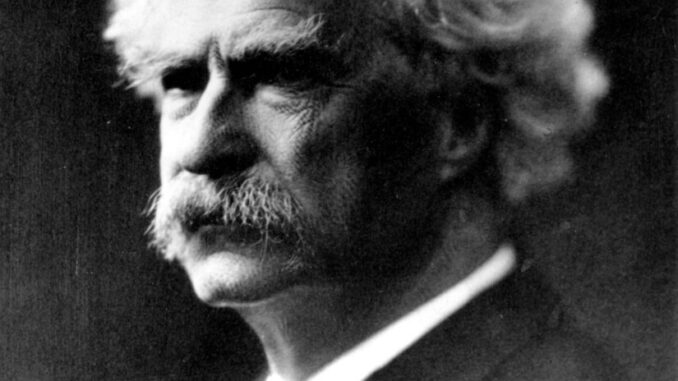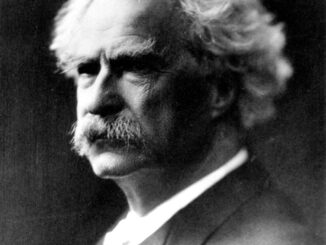
There has never been a time in the past thirty-five years when my literary shipyard hadn’t two or more half-finished ships on the ways, neglected and baking in the sun; generally, there have been three or four; at present there are five.
This has an unbusinesslike look, but it was not purposeless ― it was intentional. As long as a book would write itself, I was a faithful and interested amanuensis, and my industry did not flag; but the minute that the book tried to shift to my head the labor of contriving its situations, inventing its adventures and conducting its conversations, I put it away and dropped it out of my mind. Then I examined my unfinished properties to see if among them there might not be one whose interest in itself had revived, through a couple of years’ restful idleness, and was ready to take me on again as its amanuensis.
It was by accident that I found out that a book is pretty sure to get tired, along about the middle, and refuse to go on with its work until its powers and its interest should have been refreshed by a rest and its depleted stock of raw materials reinforced by lapse of time.
It was when I had reached the middle of “Tom Sawyer” that I made this invaluable find. At page 400 of my manuscript, the story made a sudden and determined halt and refused to proceed another step. Day after day it still refused. I was disappointed, distressed, and immeasurably astonished, for I knew quite well that the tale was not finished, and I could not understand why I was not able to go on with it.
The reason was very simple — my tank had run dry; it was empty; the stock of materials in it was exhausted; the story could not go on without materials; it could not be wrought out of nothing. When the manuscript had lain in a pigeon-hole two years, I took it out one day, and read the last chapter that I had written. It was then that I made the great discovery that when the tank runs dry you’ve only to leave it alone and it will fill up again, in time, while you are asleep — also while you are at work at other things, and are quite unaware that this unconscious and profitable cerebration is going on. There was plenty of material now, and the book went on and finished itself without any trouble.
Ever since then, when I have been writing a book, I have pigeon-holed it without misgivings when its tank ran dry, well knowing that it would fill up again without any of my help within the next two or three years, and that then the work of completing it would be simple and easy. “The Prince and the Pauper” struck work in the middle, because the tank was dry, and I did not touch it again for two years. A dry interval of two years occurred in “The Connecticut Yankee at the Court of King Arthur.” A like interval has occurred in the middle of other books of mine.
Two similar intervals have occurred in a story of mine called “Which Was It?” In fact, the second interval has gone considerably over time, for it is now four years since that second one intruded itself. I am sure that the tank is full again now, and that I could take up that book and write the other half of it without a break or any lapse of interest — but I shan’t do it. The pen is irksome to me. I was born lazy, and dictating has spoiled me. I am quite sure I shall never touch a pen again; therefore, that book will remain unfinished — a pity, too, for the idea of it is (actually) new and would spring a handsome surprise upon the reader, at the end.
There is another unfinished book, which I should probably entitle “The Refuge of The Derelicts”. It is half-finished, and will remain so. There is still another one, entitled “The Adventures of a Microbe During Three Thousand Years ― By a Microbe”. It is half-finished and will remain so. There is yet another ― “The Mysterious Stranger”. It is more than half-finished. I would dearly like to finish it, and it causes me a real pang to reflect that it is not to be. These several tanks are full now, and those books would go gaily along and complete themselves if I would hold the pen, but I am tired of the pen.
There was another of these half-finished stories. I carried it as far thirty-eight thousand words four years ago, then destroyed it for fear I might someday finish it. Huck Finn was the teller of the story and of course, Tom Sawyer and Jim were the heroes of it. But I believed that the trio had done work enough and were entitled to a permanent rest.
In Rouen, in ’93, I destroyed fifteen thousand dollars’ worth of manuscript, and in Paris, in the beginning of ’94, I destroyed ten thousand dollars’ worth — I mean, estimated as magazine stuff. I was afraid to keep those piles of manuscripts on hand, lest I be tempted to sell them, for I was fairly well-persuaded that they were not up to standard.
Ordinarily there would have been no temptation present, and I would not think of publishing doubtful stuff — but I was heavily in debt then, and the temptation to mend my condition was so strong I burnt the manuscripts to get rid of it. My wife not only made no objection, but encouraged me to do it, for she cared more for my reputation than other concern of ours. About that time, she helped me put another temptation behind me. It was an offer of sixteen thousand dollars a year, for five years, to let my name be used as editor of a humorous periodical.
I praise her for furnishing her help in that temptation, for it is her due. There was no temptation about it, in fact, but she would have offered her help, just the same, if there had been one. I can conceive of many wild and extravagant things when my imagination is in good repair, but I can conceive of nothing quite so wild and extravagant as the idea of my accepting the editorship of a humorous periodical. I should regard that as the saddest (for me) of all occupations.
If l should undertake it, I should have to add to it the occupation of undertaker, to relieve it in some degree of its cheerlessness. I could edit a serious periodical with relish and a strong interest, but I have never cared enough about humor to qualify me to edit it or sit in judgment upon it.
Aug. 30, 1906, entry — Autobiography of Mark Twain Part Two.

